The modern workplace is evolving, and a traditional four-year degree is no longer the only key to a successful career. Companies are increasingly prioritizing demonstrable skills, hands-on experience, and raw potential over formal education, opening up a world of high-paying remote opportunities. This guide is for ambitious individuals ready to bypass the traditional college route and dive directly into the flexible world of remote work. We have curated a list of the most effective platforms and job categories where you can find legitimate remote work from home jobs no degree is required for.
This article provides a clear roadmap to launching your new career from anywhere. For each entry, we break down specific roles, realistic salary expectations, the exact skills you need to cultivate, and actionable strategies to make your application stand out from the competition. Beyond just listing websites, understanding the strategy behind a successful application is vital. Learning how to master your remote work job search is crucial for finding and securing positions that align with your skills and goals.
Forget the myth that you need a diploma to earn a great living from your home office. Let’s uncover the real paths to success.
1. Remote Data Entry Jobs
For individuals seeking accessible and flexible remote work from home jobs no degree is often a primary requirement. Remote First Jobs directly addresses this need with its dedicated platform for Remote Data Entry Jobs. It stands out as a premier resource, meticulously curating thousands of legitimate, current opportunities from a network of over 21,000 vetted companies. This platform is expertly designed for job seekers who value precision, speed, and the freedom of a remote career path without the prerequisite of a university degree.
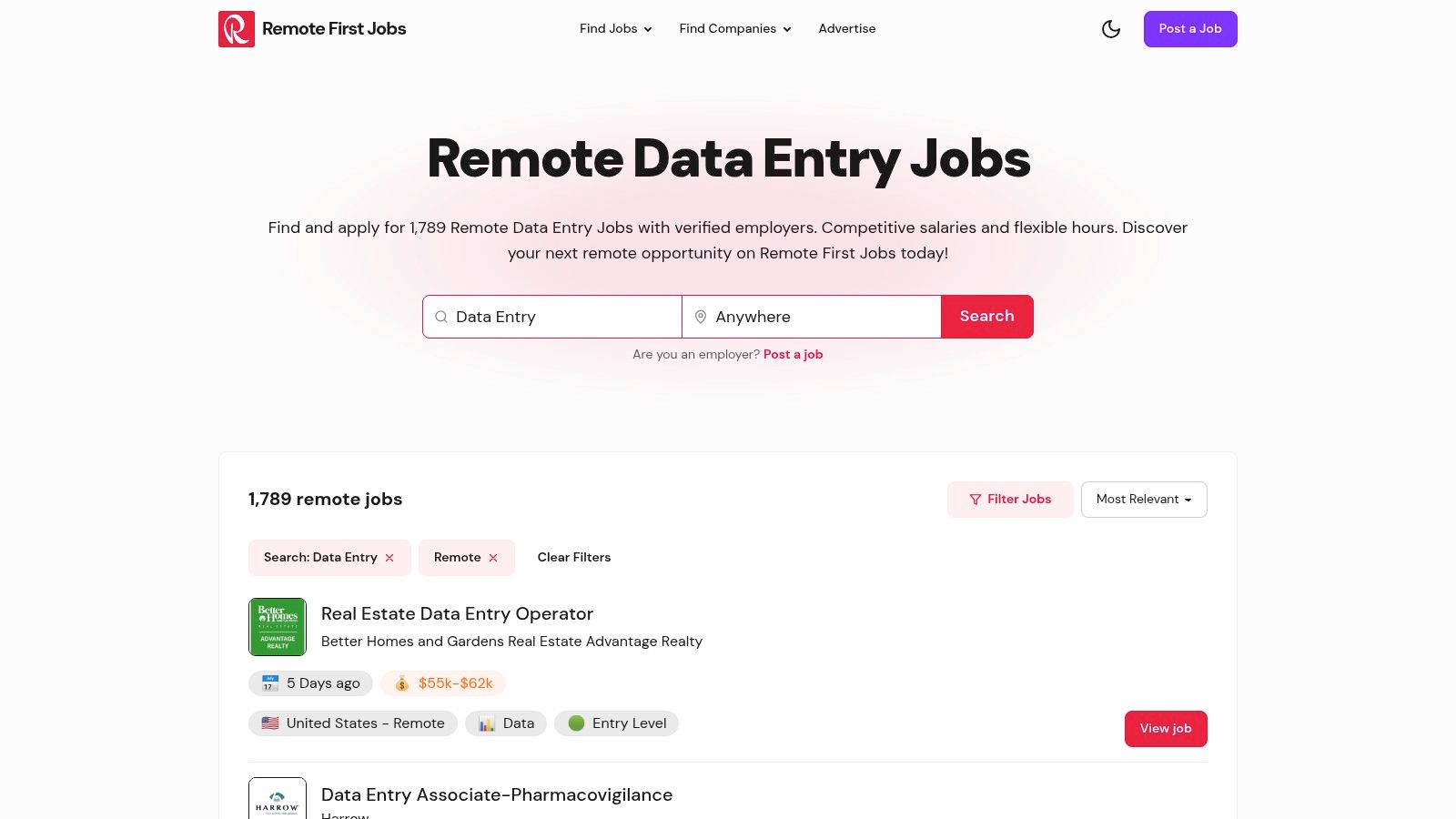
The platform distinguishes itself through a commitment to quality and user experience. Unlike generic job boards, it guarantees a spam-free environment, ensuring that every listing is from a reputable source. This saves you valuable time and protects you from fraudulent postings, allowing you to focus your energy on crafting compelling applications.
Key Platform Strengths
Remote First Jobs excels with a powerful and intuitive search interface. Users can move beyond simple keyword searches and apply granular filters to find the perfect role.
- Advanced Filtering: Effortlessly narrow your search by specific skills (e.g., “typing speed,” “Microsoft Excel”), job titles (“Data Entry Clerk,” “Transcriptionist”), industry, or even specific companies.
- Verified Opportunities: Every job posting is sourced from established employers, providing a trustworthy and reliable job-hunting experience.
- User-Centric Design: The interface is clean and straightforward, making navigation and application tracking simple for users of all technical skill levels.
Maximizing Your Job Search
To get the most out of this platform, leverage its features strategically. Set up job alerts for specific keywords or companies to receive instant notifications about new openings. Tailor your resume to highlight skills mentioned in job descriptions, such as WPM (words per minute) typing speed and proficiency with data management software.
The platform also provides a wealth of career resources. Before you apply, explore their articles on optimizing your home office. Getting insights into creating an efficient workspace can be a key differentiator. Find out more about an effective remote work setup at remotefirstjobs.com.
Website: remotefirstjobs.com/remote-data-entry-jobs
2. FlexJobs
FlexJobs is a highly respected, long-standing player in the remote job market, and for good reason. It operates on a subscription model, which acts as a powerful filter, weeding out scams and low-quality listings common on free job boards. This curated approach makes it an exceptional resource for finding legitimate remote work from home jobs no degree required. Every single job posting on the site is hand-screened by a real person before it goes live, ensuring you’re only browsing high-quality, vetted opportunities.
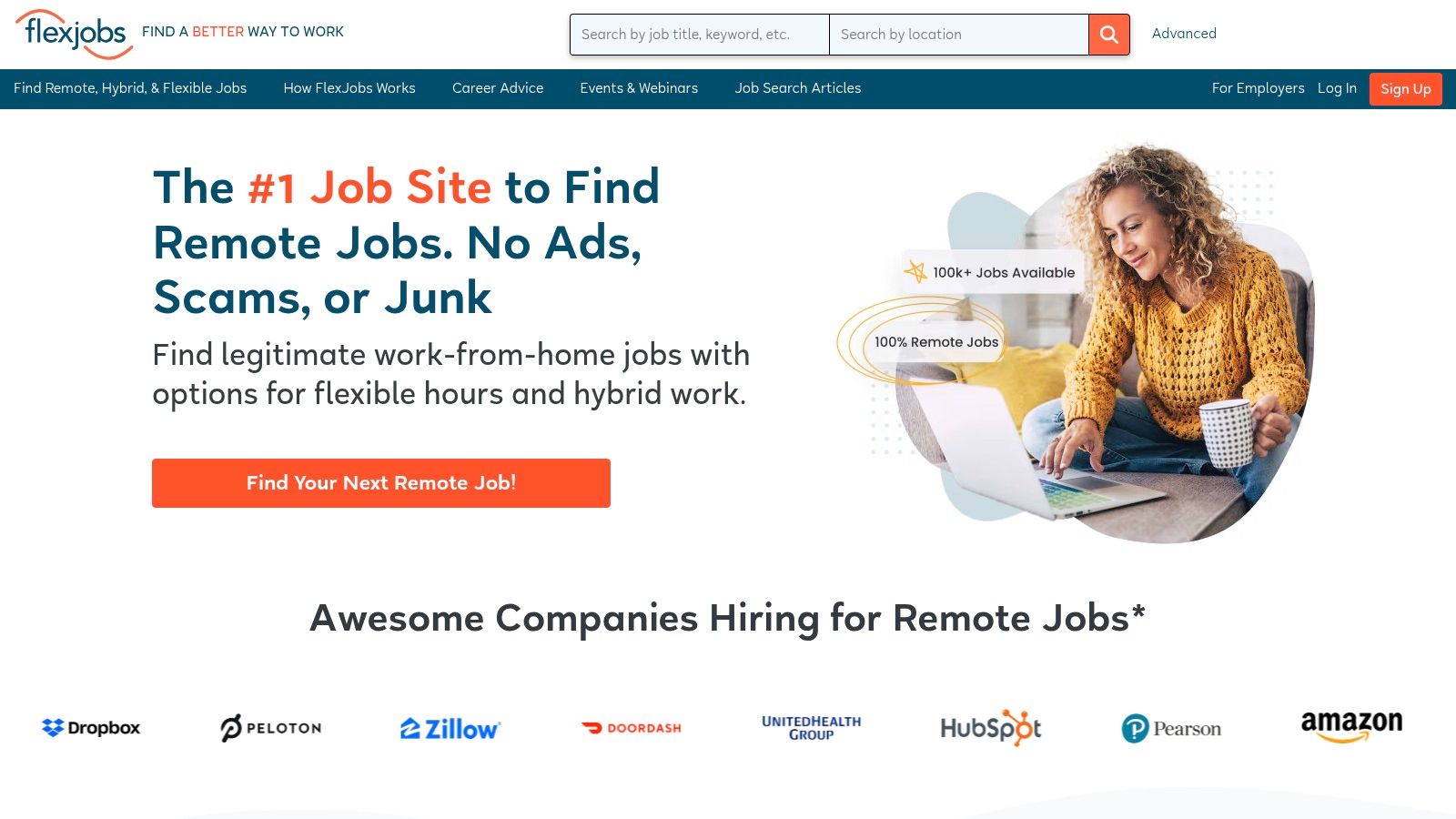
While the paywall might seem like a downside, it creates a more serious and professional job-seeking environment. The platform features over 50 career categories, with many roles in customer service, data entry, and virtual assistance that prioritize skills and experience over a four-year degree. The user interface is clean and allows for powerful filtering, so you can specifically search for “100% remote” and “entry-level” roles to match your needs.
Key Features and How to Use Them
- Advanced Job Filters: Don’t just browse. Use the filters to narrow your search by job type (employee, freelance), career level (entry-level), and specific keywords like “no degree.” This saves significant time.
- Company Vetting: Take advantage of the detailed company profiles. Before applying, research the company directly on FlexJobs to understand its remote work policies and culture.
- Skills Tests: Complete the free skills tests available to subscribers. Passing these tests can add a verifiable credential to your profile, making you a more attractive candidate for employers.
- Job Search Resources: Your subscription includes access to resume reviews, career coaching, and informative webinars. These are invaluable tools for honing your application strategy.
Pros & Cons
| Pros | Cons |
|---|---|
| High-Quality, Vetted Listings: Virtually no scams or “ghost” jobs. | Subscription Fee: Requires payment to view full listings. |
| Excellent Search Filters: Easily find roles matching your criteria. | Hybrid Roles Included: Not all jobs are 100% remote. |
| Dedicated “No Degree” Resources: Blog posts and guides for non-degree job seekers. |
Accessing the full job listings requires a subscription, with plans typically starting around $25 for one month, with discounts for longer commitments. However, they offer a satisfaction guarantee. For more detailed insights into why it’s considered one of the best remote job websites, you can explore further comparisons and reviews.
Website: https://www.flexjobs.com
3. We Work Remotely (WWR)
We Work Remotely (WWR) is one of the largest and most established remote-only job boards on the internet, making it a powerhouse for anyone seeking legitimate work-from-home opportunities. Unlike platforms that charge job seekers, WWR is completely free to browse and apply, removing any financial barrier to entry. This focus on accessibility, combined with a high volume of new listings daily, makes it a top destination for finding remote work from home jobs no degree required, especially in fields like customer support, sales, and administration.
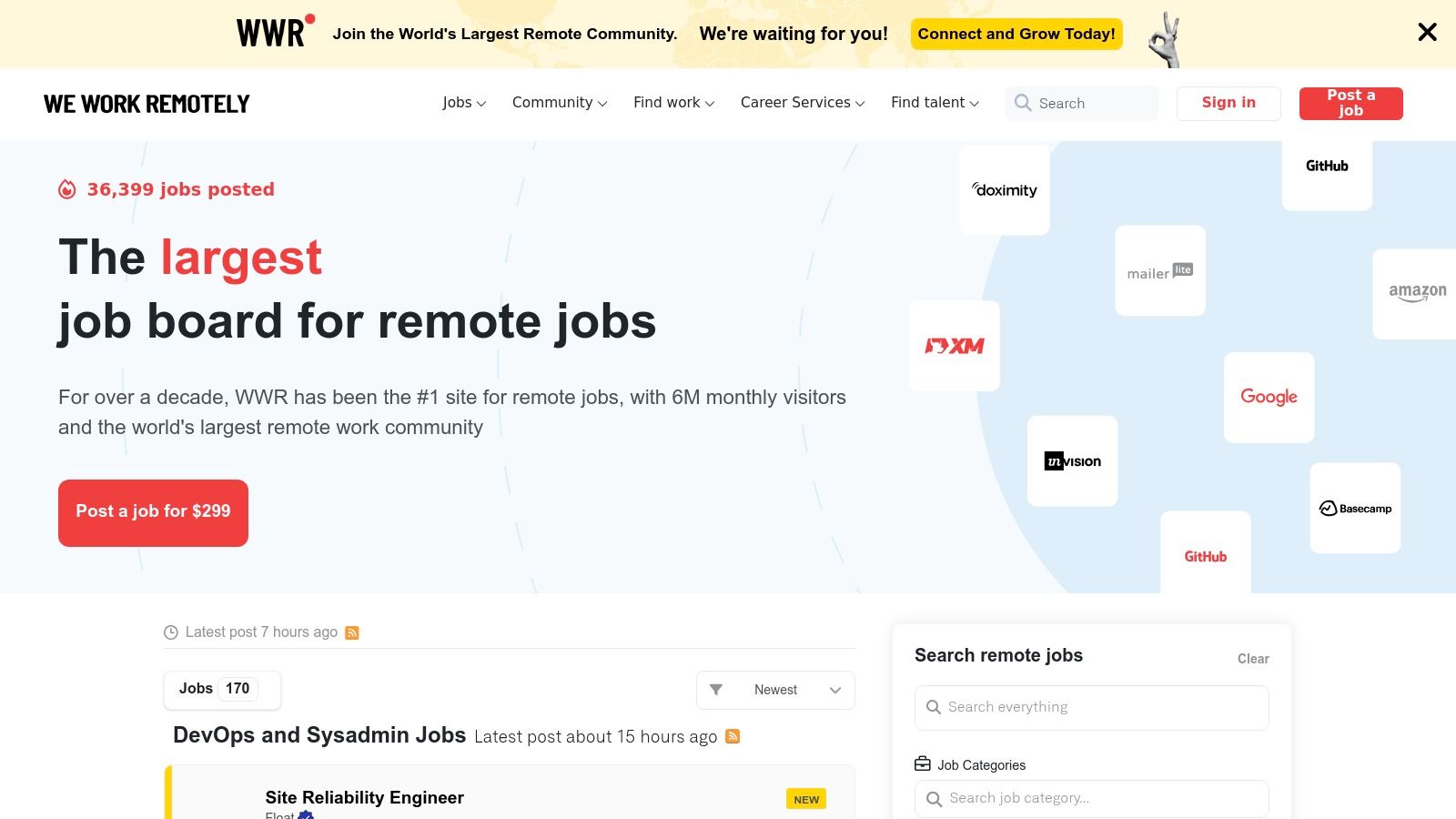
The platform is trusted by both startups and established tech companies, ensuring a steady stream of quality roles. While many positions are in tech, a significant portion is dedicated to non-technical roles where skills and practical experience are valued more than a traditional degree. Its straightforward, no-nonsense interface allows you to quickly scan opportunities without navigating complex profiles or sign-up processes, getting you straight to the application.
Key Features and How to Use Them
- Keyword and Category Search: Use specific keywords like “customer service” or “data entry” combined with the relevant category filter to quickly find roles that don’t list a degree as a hard requirement.
- No Sign-Up Browsing: You can start your job search immediately without creating an account. This is ideal for quickly checking new listings without commitment.
- “Top 100 Remote Companies” List: Regularly check this curated list on their site. It gives you insight into which companies are consistently hiring for remote roles, allowing you to target your applications more effectively.
- Clear Job Descriptions: WWR encourages companies to be transparent. Pay close attention to the “Requirements” section of a job post to see if they emphasize skills over formal education.
Pros & Cons
| Pros | Cons |
|---|---|
| Completely Free for Job Seekers: No fees to browse or apply for jobs. | Highly Competitive: Popular roles attract a global talent pool. |
| High Volume of Fresh Listings: New remote jobs are posted daily. | Some Roles Require Experience: Not all listings are entry-level. |
| Trusted by Major Companies: Features jobs from well-known brands. |
WWR’s commitment to a 100% remote work ethos ensures you won’t have to sift through hybrid or location-specific roles disguised as fully remote. The platform’s active community and resource sections also provide valuable insights, and you can discover more strategies on how to find remote jobs to maximize your chances of success.
Website: https://weworkremotely.com
4. Remote.co
Remote.co, a sister site to FlexJobs, stands out by offering a completely free-to-use job board packed with remote opportunities. This makes it an incredibly accessible starting point for anyone seeking remote work from home jobs no degree required, as there’s no paywall to browse or apply. The platform focuses heavily on providing not just job listings, but also valuable educational content, including company Q&As and articles specifically for those new to the remote workforce.
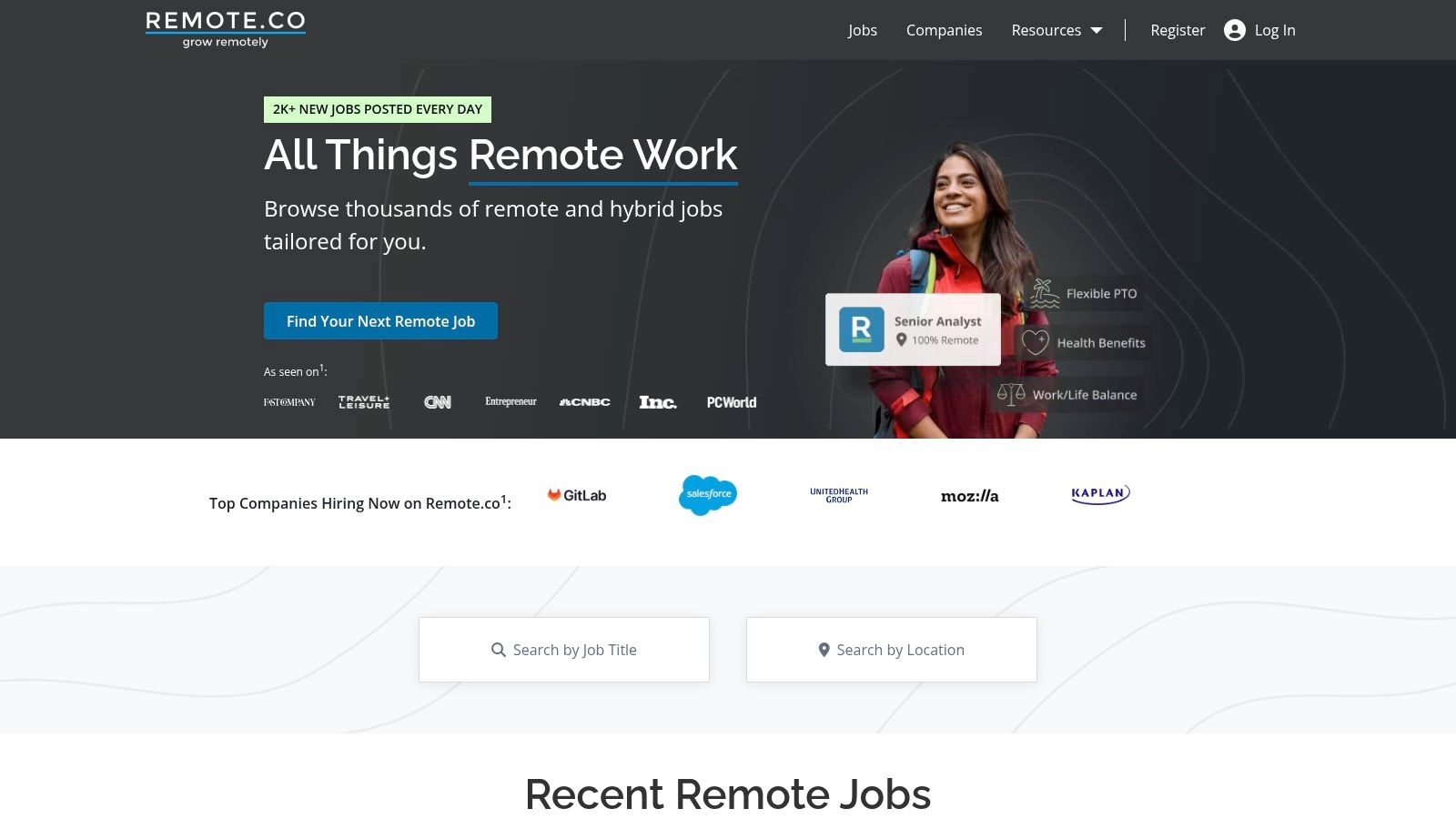
Unlike its subscription-based counterpart, Remote.co allows immediate access to thousands of current remote roles across more than 100 categories. You’ll find a high volume of listings in fields like administration, data entry, customer support, and transcription, which often value practical skills over formal education. The user experience is straightforward, allowing you to quickly jump into relevant job categories and begin your search without any barriers.
Key Features and How to Use Them
- Job Category Browsing: Instead of complex filters, start by browsing the most relevant categories for non-degree roles, such as “Customer Service Jobs,” “Data Entry Jobs,” or “Virtual Assistant Jobs.” This is a quick way to see what’s available.
- Educational Content: Before applying, explore the “Remote Work Q&A” section. You can find real-world advice from remote company leaders on what they look for in candidates, which is invaluable for tailoring your application.
- Company Search: Use the “Find Remote Companies” feature to identify businesses that are fully remote. This helps you target your job search toward organizations that have a strong remote culture.
- Keyword Search: Use the main search bar with specific terms like “entry level,” “no experience,” or “training provided” to uncover hidden gems that might not be categorized traditionally.
Pros & Cons
| Pros | Cons |
|---|---|
| Completely Free to Use: No subscription or fees to access listings. | Mixed Remote/Hybrid Roles: Requires careful reading of job descriptions. |
| Rich Educational Resources: Excellent Q&As and articles for job seekers. | Geographic Restrictions: Some jobs are location-dependent. |
| Direct Access to Applications: Links you directly to the company’s hiring page. | Higher Volume of Listings: You may need to sift through more roles. |
Remote.co is a powerful, cost-free resource that combines a robust job board with essential learning materials. It’s an ideal platform for those who want to dive into the remote job market and gain insights into the remote work landscape without a financial commitment.
Website: https://remote.co
5. Indeed (with Remote + Entry-Level/Experience filters)
As one of the world’s largest job aggregators, Indeed is a powerhouse resource that you can leverage to find remote work from home jobs no degree required, if you know how to use its tools effectively. Unlike curated platforms, Indeed casts an incredibly wide net, pulling in listings from company career pages, staffing firms, and other job boards. This massive volume means more opportunities, but it also requires a strategic approach to sift through the noise and find legitimate, high-quality remote roles.
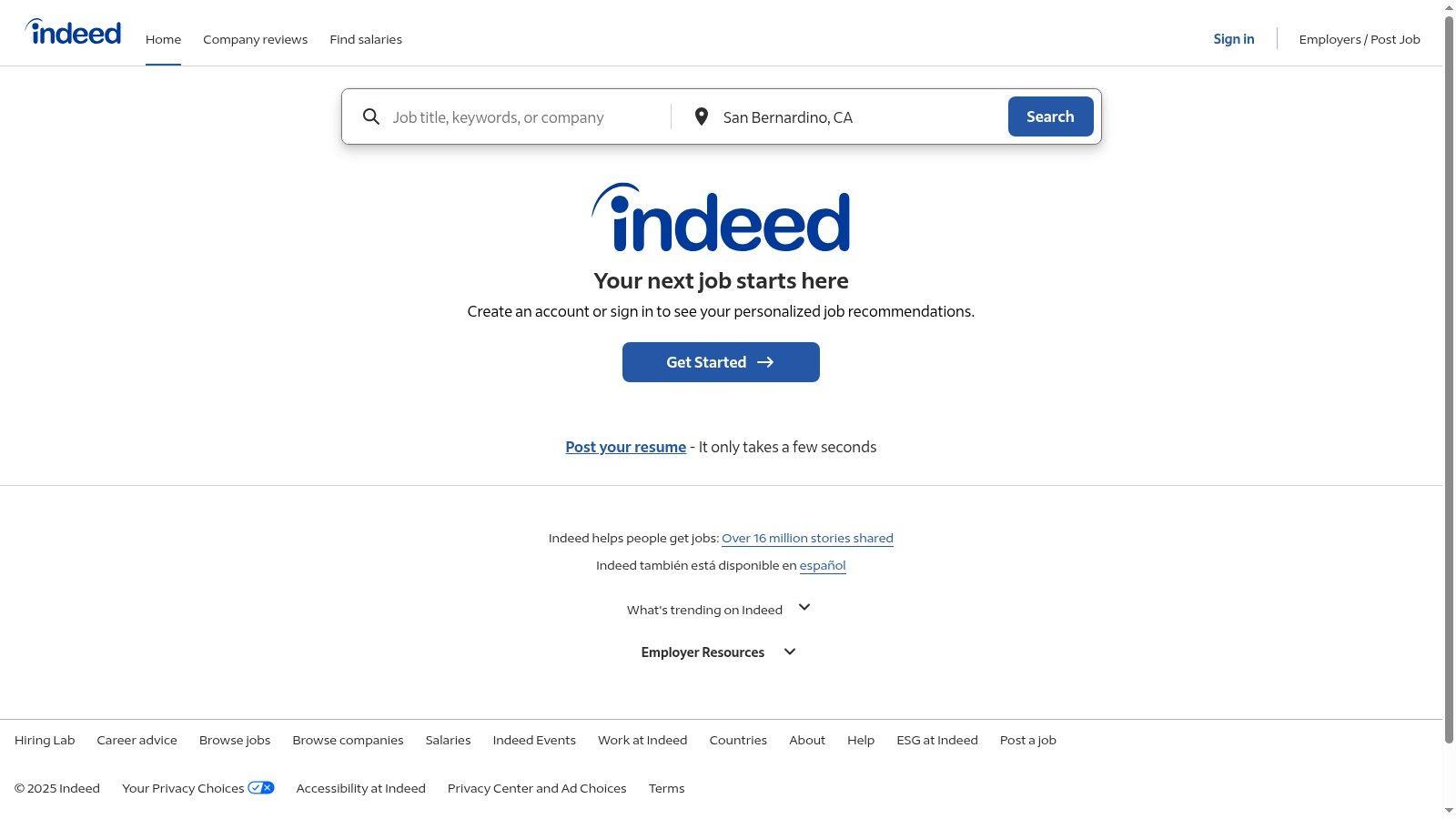
The key to success on Indeed is mastering its search and filter functions. By using a combination of the “Remote” location filter and specific keywords in the “What” field, you can zero in on positions that align with your skills and don’t require a college diploma. Because the platform is free for job seekers, you can create a profile, upload a resume, and set up job alerts without any financial commitment, giving you a powerful tool to act quickly when new roles are posted.
Key Features and How to Use Them
- Strategic Keyword Searches: Don’t just search for “customer service.” Use more specific queries like
"entry level" remote data entry no degreeor"work from home" virtual assistantto get better results. Using quotes around phrases tells the search engine to look for that exact term. - Location Filter for “Remote”: In the “Where” box, simply type “Remote.” This is the most crucial step to filter out all on-site positions from your search results.
- Free Job Alerts: Once you have a search query that yields good results, create a job alert for it. Indeed will email you new listings that match your criteria daily or weekly, ensuring you’re among the first to apply.
- Company Reviews: Before applying, check the company’s reviews on Indeed. Previous and current employees often leave feedback about the work culture and management, which is especially valuable for remote positions.
Pros & Cons
| Pros | Cons |
|---|---|
| Unmatched Volume of Listings: The sheer number of jobs is its biggest advantage. | Quality Can Vary: You must vet listings carefully for scams or vague details. |
| Completely Free for Job Seekers: No subscription fees to apply or view jobs. | Less Precise Filtering: Search tools are powerful but less refined than paid sites. |
| Job Alerts Keep You Competitive: Get notified of new roles immediately. | Location-Specific Remote Roles: Many “remote” jobs require you to live in a certain state. |
Indeed is an essential, free tool in any job search. Its massive database offers unparalleled access to a wide variety of roles, making it a great starting point. For more tips on getting started, you can find guides on how to discover entry-level remote jobs with no experience.
Website: https://www.indeed.com
6. Upwork (Freelance marketplace)
Upwork is the world’s largest freelance marketplace, making it a powerhouse for finding project-based remote work from home jobs no degree required. Instead of traditional employment, Upwork connects you directly with clients seeking specific skills for short-term or ongoing projects. This model is perfect for demonstrating your abilities in areas like virtual assistance, data entry, customer support, and transcription, where proven skills often outweigh formal education. The platform’s sheer volume of job postings means there is a constant stream of opportunities for entry-level freelancers.

While the competition can be stiff, Upwork provides a structured environment to build a portfolio, gain verifiable experience, and establish a reputation through client reviews. The platform handles payments securely through an escrow system, giving you peace of mind that you’ll be paid for completed work. By focusing on creating a strong profile and writing compelling proposals, you can quickly land your first few projects and build momentum.
Key Features and How to Use Them
- Build a Specialized Profile: Don’t be a jack-of-all-trades. Create a profile that highlights a specific skill set, such as “Customer Service Specialist for E-commerce Brands.” This makes you more visible to relevant clients.
- Craft Custom Proposals: Avoid generic, copy-pasted proposals. Read each job description carefully and write a personalized response that directly addresses the client’s needs and explains how your skills solve their problem.
- Leverage Client History: Before bidding, review a client’s history, including their average hourly rate paid and reviews from other freelancers. This helps you filter for high-quality clients and avoid potential issues.
- Start with Small Projects: To build your Job Success Score, start by applying for smaller, quicker projects. Positive feedback on these jobs will make your profile much more attractive for larger, higher-paying gigs.
Pros & Cons
| Pros | Cons |
|---|---|
| High Demand for Entry-Level Skills: Constant flow of projects for admin, support, and data tasks. | Highly Competitive: You’re bidding against a global talent pool. |
| Secure Payment System: Escrow service protects your earnings. | Platform Fees: Upwork takes a service fee from your earnings. |
| Transparent Client Feedback: Public reviews help you build a strong reputation. | Requires “Connects” to Apply: You have a limited number of free applications per month. |
Signing up and creating a profile on Upwork is free. You are given a limited number of “Connects” (digital tokens) each month to apply for jobs; additional Connects can be purchased. The platform’s structure is ideal for those looking to turn skills into a flexible, remote freelance career without a degree.
Website: https://www.upwork.com
7. TELUS International AI Community (U.S. Rater and similar roles)
TELUS International offers a unique gateway into the world of AI and machine learning, providing flexible, part-time roles that are perfect for those seeking remote work from home jobs no degree required. The platform specializes in contracting independent “raters” or “annotators” to help improve search engine results, evaluate online content, and label data for AI systems. These roles, such as U.S. Rater, are accessible to anyone over 18 with U.S. residency and English fluency, typically only requiring a high school diploma or equivalent.

What makes TELUS stand out is its direct entry point into a technical field without the need for formal qualifications. The work is self-paced, allowing you to set your own schedule, which is ideal for students, parents, or anyone needing a flexible side income. The company provides extensive online guidelines and training before you begin, so you are well-prepared for the tasks ahead. While the qualification process can be rigorous, successfully passing it unlocks a consistent stream of interesting and impactful work.
Key Features and How to Use Them
- Task-Based Work: The work is project-based and paid per task or hour. Focus on mastering the guidelines for one type of task to maximize your efficiency and earnings.
- Clear Eligibility Requirements: The job descriptions clearly outline all requirements upfront, including residency, age, and necessary equipment (like a smartphone and computer). Ensure you meet all criteria before applying.
- Online Training and Guidelines: Don’t skim the training materials. These documents are your key to passing the qualification exams and performing well on the job. Treat them like a textbook for an open-book test.
- Resume Optimization: Even without a degree, your resume matters. Highlight your attention to detail, ability to work independently, and technical savviness. For guidance, you can explore resources on professional resume help.
Pros & Cons
| Pros | Cons |
|---|---|
| No 4-Year Degree Required: An accessible entry point for remote work. | Hiring Varies: Availability is in waves; you may need to wait. |
| Flexible Scheduling: Complete tasks on your own time. | Tough Qualification Tests: Exams are common with limited feedback. |
| Contribute to AI: Your work directly impacts major tech products. | Pay Rates Vary: Compensation differs by project and complexity. |
Access to apply for these roles is completely free, though you must pass a multi-part qualification exam to be accepted. The application process is straightforward, but patience is key, as hiring happens in cycles based on project needs. The work provides a valuable glimpse into the AI industry and a solid, flexible income source for those who qualify.
Website: https://jobs.telusinternational.com
Top 7 Remote Work No-Degree Job Platforms Comparison
| Platform | Implementation Complexity 🔄 | Resource Requirements ⚡ | Expected Outcomes 📊 | Ideal Use Cases 💡 | Key Advantages ⭐ |
|---|---|---|---|---|---|
| Remote Data Entry Jobs | Low – straightforward job search & apply | Minimal – no degree needed, basic skills | Entry-level remote work, limited career growth | Flexible, work-from-home data entry roles | Large vetted listings, spam-free, supportive resources |
| FlexJobs | Medium – subscription and vetted listings | Moderate – paid access, resume/coaching support | Curated, reliable flexible & remote jobs | Flexible, hybrid, remote jobs with quality control | High-quality, manually vetted, satisfaction guarantee |
| We Work Remotely (WWR) | Low – free access, simple filters | Minimal – no cost to job seekers | Access to many remote listings | Established companies offering remote roles | Free access, high volume of fresh postings |
| Remote.co | Low – free listings, educational content | Minimal – no paywall, broad filters | Broad range of remote/hybrid jobs | New remote workers seeking education + jobs | Free access, strong educational resources |
| Indeed (Remote + Entry-Level) | Low-Medium – large site, filters needed | Minimal – free, self-directed search | Wide-ranging remote listings | Anyone seeking US-based remote jobs | Massive listings, free alerts, wide employer reach |
| Upwork (Freelance marketplace) | Medium-High – bidding & proposals needed | Moderate – proposal crafting, limited free applies | Remote freelance gigs, portfolio building | Freelancers seeking remote, entry-level freelance work | Secure payments, client reviews, diverse freelance jobs |
| TELUS International AI Community | Low – self-paced tasks and online training | Minimal – basic equipment, US residency req | Part-time remote AI/data annotation jobs | US-based, flexible, part-time remote AI evaluator roles | No degree required, flexible scheduling, training provided |
Launch Your Remote Career Today—No Degree Required
The journey into the world of remote work is no longer gated by a traditional four-year degree. As we’ve explored, a diverse landscape of high-quality, fulfilling remote work from home jobs no degree is not just a possibility, it’s a rapidly growing reality. From the focused data entry roles to the community-driven work on platforms like TELUS International, the common thread is the value placed on demonstrable skills, reliability, and a proactive mindset.
The myth that a great remote career requires a college diploma is officially busted. Your experience, your self-taught skills, and your ability to deliver results are the new currency in the digital-first job market. The key is to shift your focus from what you lack in formal education to what you can offer in tangible value.
Your Strategic Next Steps
To turn these insights into a paycheck, you need a clear plan of action. Don’t just browse; strategize your job search.
- Platform Selection: Choose the right tool for the job. If you are seeking consistent, full-time employment, platforms like FlexJobs and We Work Remotely are excellent starting points. For those who prefer project-based work to build a portfolio, Upwork offers a direct path to gaining hands-on experience and client testimonials.
- Skill-Centric Resume: Redesign your resume to be a “skills-first” document. Instead of leading with an education section, create a powerful summary that highlights your top three relevant skills, followed by a portfolio or project section that provides concrete proof of your abilities.
- Portfolio is Proof: For roles like social media management, virtual assistance, or customer service, a simple portfolio is non-negotiable. This could be a one-page website showcasing testimonials, a presentation deck detailing a project you managed, or even a well-organized document with screenshots of your work.
Broadening Your Horizons
As you build your career, remember that the remote job market is constantly evolving. While the roles we covered are fantastic entry points, don’t limit your search. New industries are embracing remote work and often prioritize skills over degrees. For those looking beyond traditional tech roles, exploring resources for finding non-tech positions in the Web3 space can open up unexpected remote opportunities that often do not require a specific degree. This emerging field values community builders, moderators, and operations specialists, roles where practical skills are paramount.
The path is clear. The tools we’ve discussed, from the broad reach of Indeed to the curated listings on Remote.co, are your launchpads. Your success now hinges on your ability to package your skills effectively and apply strategically. Your ideal remote job is out there, waiting for you to demonstrate your value and take the first step toward a more flexible and fulfilling career.
Ready to find your perfect remote role without a degree? Start your search on Remote First Jobs, where we specialize in connecting talented individuals like you with legitimate, high-quality remote opportunities. Filter jobs specifically for entry-level positions and find companies that value skills over formal education at Remote First Jobs.






